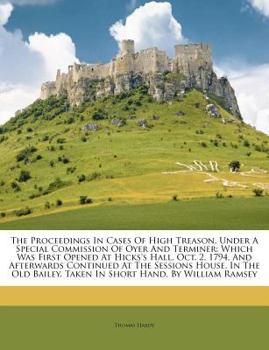The Proceedings In Cases Of High Treason, Under A Special Commission Of Oyer And Terminer: Which Was First Opened At Hicks's Hall, Oct. 2, 1794, And A
Select Format
Select Condition 
Book Overview
"The Proceedings In Cases Of High Treason" offers a detailed account of the treason trials held under a special commission in 1794. This historical record, meticulously taken in shorthand by William Ramsey, provides invaluable insights into the legal and political climate of late 18th-century England. The trials, initially convened at Hicks's Hall and later moved to the Sessions House in the Old Bailey, involved figures like Thomas Hardy and reflect the era's anxieties about political dissent and revolutionary fervor.
This volume captures the intricacies of the legal arguments, the testimonies presented, and the overall atmosphere of the proceedings, making it an essential resource for legal scholars, historians, and anyone interested in the intersection of law, politics, and society during a pivotal period in British history. The detailed record allows readers to delve deep into the strategies and justifications employed by both the prosecution and the defense, providing a nuanced understanding of the era's legal practices and political tensions.
This work has been selected by scholars as being culturally important, and is part of the knowledge base of civilization as we know it. This work was reproduced from the original artifact, and remains as true to the original work as possible. Therefore, you will see the original copyright references, library stamps (as most of these works have been housed in our most important libraries around the world), and other notations in the work.
This work is in the public domain in the United States of America, and possibly other nations. Within the United States, you may freely copy and distribute this work, as no entity (individual or corporate) has a copyright on the body of the work.
As a reproduction of a historical artifact, this work may contain missing or blurred pages, poor pictures, errant marks, etc. Scholars believe, and we concur, that this work is important enough to be preserved, reproduced, and made generally available to the public. We appreciate your support of the preservation process, and thank you for being an important part of keeping this knowledge alive and relevant.





